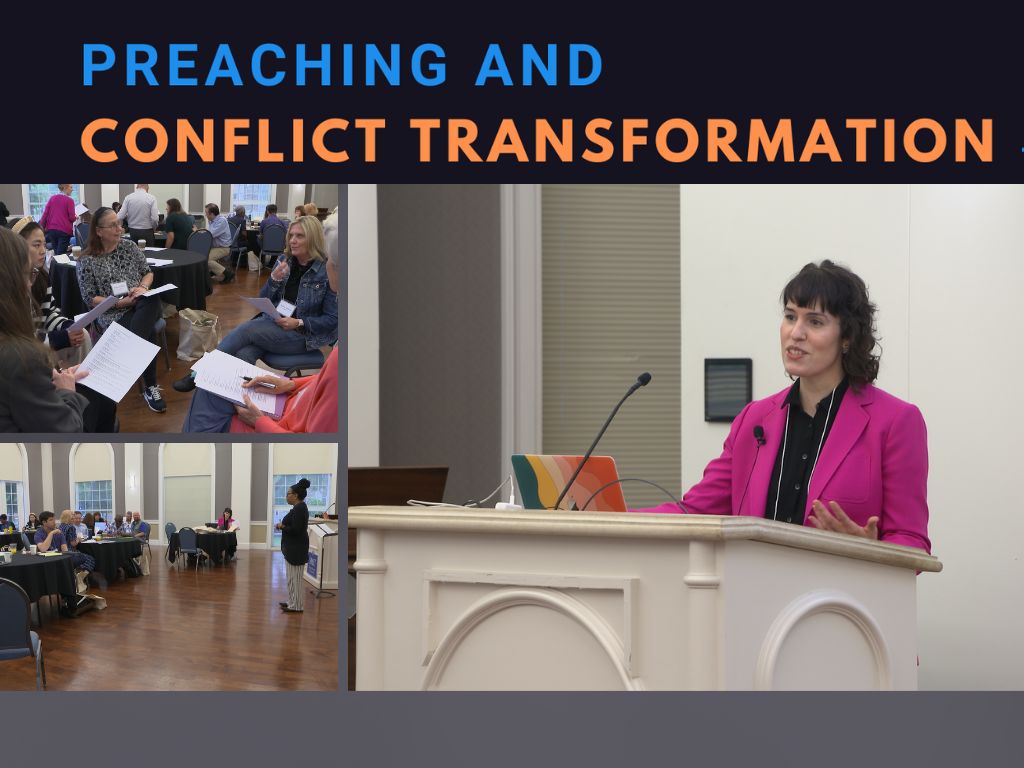Preaching and Transformation Workshop April 16, 2024
by Perkins Center for Preaching Excellence on Tuesday, May 28, 2024

On April 16, 2024, the Perkins Center for Preaching Excellence at SMU sponsored an in-person workshop entitled “Preaching and Conflict Transformation.” This event, co-led by homiletician Dr. Joni Sancken and conflict transformation expert Dr. Regina Stoltzfus, was designed to equip preachers with the tools and wisdom needed to address conflict from the pulpit. It focused on the idea that while conflict is an inevitable part of life, it can also be a powerful vehicle for sanctification and growth, both for individuals and communities.
Embracing the Reality of Conflict
The workshop began with an acknowledgment of a common misconception among Christians: the belief that conflict is solely a manifestation of sin and brokenness. Many of us dream of a conflict-free world where everyone is in perfect harmony, and the realities of conflict in our marriages, homes, friendships, and neighborhoods often feel like a stark contrast to this ideal. However, as the workshop highlighted, conflict is an inherent part of being human. While it can indeed lead to pain and brokenness, it also has the potential to be a transformative force.
Conflict as a Tool for Sanctification
One of the most powerful takeaways from the workshop was the idea that conflict can be a tool for sanctification. This perspective encourages us to see conflict not merely as something to be avoided but as an opportunity for the Spirit to bring about transformation in our lives and communities. Participants shared personal anecdotes, such as the memory of a congregational dispute over the color of the sanctuary carpet. These seemingly trivial conflicts often have deeper roots, reflecting underlying issues that need to be addressed for true healing and growth to occur.
Tools for Addressing Conflict
Throughout the workshop, participants were introduced to various approaches to identifying and addressing conflict constructively. One attendee shared that the event had already been quite helpful in reminding them of the often-overlooked underpinnings of conflict. This newfound awareness will enable them to approach conflicts with a more nuanced perspective, considering not just the immediate issue but also the deeper emotions and concerns at play.
Another participant expressed their newfound confidence in addressing conflict, highlighting the importance of not being afraid to confront challenging situations. The tools and techniques learned during the workshop will empower preachers to identify conflict early and navigate it in a way that promotes healing and reconciliation.
Moving Forward with Hope
As we reflect on the workshop, it's clear that it provided much more than just practical tools. It offered a renewed sense of hope and purpose. Conflict, while often daunting, is also an opportunity for growth and transformation. By embracing this positive perspective on conflict, preachers can help guide their congregations through it in a way that fosters peace and unity.
One attendee summed it up beautifully: "Conflict always happens, and finding ways to address it positively and finding a way forward is essential in a world with so many opportunities for conflict today. People often look to pastors for guidance, and this workshop has equipped me with new tools to help my community navigate these challenges."
Participants’ Testimonials
“Both the overview of conflict and the tie-ins to preaching were excellent. I thought it was a perfect balance of large group conversation and small table group discussion as well as a perfect balance between theory and practice. There was an excellent exploration of ideas, as well as specific ways to implement some of that theory.”
“I came back with a richer understanding of Conflict Transformation as well as ideas on how to craft sermons that are aware of and respond to conflict within the congregation and the wider world.”
“It was the best church conference I've attended in a while. I really appreciated the diversity represented in both the presenters and the gathered group-- different denominations, genders, and races make for a richer conversation. The "and" language of the series really opens up creative thinking and dialogue in a necessary way.”
